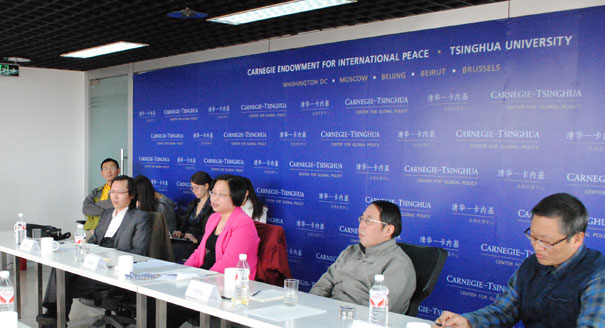Registration
You will receive an email confirming your registration.
Leaders in China and the EU currently claim to have a stable, mutually beneficial bilateral relationship bolstered by economic and trade ties. The EU is China’s largest trading partner, while China is the EU’s second largest trading partner. This growth in trade has been complemented by increased cultural exchange between the two regions. However, Sino-EU relations still face significant obstacles, such as the EU’s arms embargo against China and frequent trade frictions stemming from diverging opinions on political disputes.
The Carnegie–Tsinghua Center for Global Policy hosted a roundtable discussion to address significant disagreements between China and the EU on cultural diplomacy. Featured panelists included Shi Yinhong, a professor at Renmin University, Huang Yusheng, a professor at Tsinghua University, Fang Lexian, a professor at Renmin University, Zheng Li Qiao, head of the Department of European Affairs at the Ministry of Foreign Affairs, Fan Yongpeng, director of the international department at Social Sciences in China Press, and Michel Bonnin, director of Sino-France Social Science Research Center at Tsinghua University. Carnegie-Tsinghua’s Zhang Lihua moderated the event.
International Intervention
- Theories of Intervention: One chief point of contention between China and the EU is when international parties should intervene in the domestic affairs of another nation. Shi briefly introduced two theories for international intervention:
- Classical Realism: “Classical realists argue that the security of a state should not be threatened if it does not accept offers of outside intervention. By principle, international intervention should occur only when the state invites it. In addition, he added that classical realists would argue that international law does not have the authority to determine the right of a state to defend its own sovereignty.
- Classical Liberalism: Shi explained that classical liberalists argue that intervention is justified under special conditions and that any international intervention must protect basic human rights. This type of justified intervention must be carried out at the will of majority of the people. Shi added that humanitarian intervention must serve a moral purpose and be used only in situations like preventing crimes against humanity.
- Shift in Historical View: Under the leadership of Mao Zedong, Shi explained that the Communist Party of China followed a policy of unconditional equality for all states and nations. It denounced any intervention and oppression of weak nations by stronger nations. During Deng Xiaoping era, Shi said that China insisted that state sovereignty was non-negotiable and international intervention was unnecessary. In the current neo-internationalist view, he added that China’s worldview on sovereignty is changing.
- Human Rights: Huang explained that there is a philosophical relationship between human rights and sovereignty. Since humanity is an ethical community, Huang stated that people are responsible to protect their own rights. The state, Huang added, assumes these rights on behalf of its constituents. Fan responded that there remain differences between theory and practice, cautioning the need for conservatism in practice.
Influence of Culture in EU’s Foreign Policy Framework
- Evolution of EU Culture: Fang explained that the EU agenda has three basic objectives: first, enhance cultural diversity and multicultural dialogue; second, support culture as a catalyst for creativity within the Lisbon Strategy; and third, incorporate culture in the EU’s external relations.
- Shifting Focus to Developing Countries: In terms of cultural diplomacy, Fang explained that the EU is shifting its focus to developing countries and emerging global partners such as China, Brazil, India, and Mexico. Despite the fact the EU remains mired in the European debt crisis, the EU continues to conduct cultural exchanges with the main developing countries, including China.
- Differences and Similarities Between China and the EU: Zheng noted several overarching differences and similarities between Chinese and EU cultural diplomacy. He added that culture has a significant influence on both powers’ ideologies and policies. This cultural influence includes diplomatic negotiations. However, Zheng added that both China and the EU claim there is common ground between the two powers’ culture. As a result, he added, culture makes up an important part of current Sino-EU relations.
